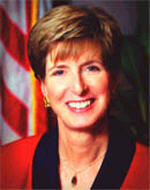 |


|
|
U.S. Isolation on Kyoto |
|
Environmental News Service
The opinions of these countries were sought as a gauge of developed and developing countries' opinions following the United States' withdrawal from climate change talks in late March. President George W. Bush left Christie Todd Whitman, head of the U.S. Environmental Protection Agency, to announce March 28 that the U.S. had "no interest in implementing that treaty," referring to the Kyoto Protocol. A week later, Larsson and other European Union officials visited Washington, DC, but received little encouragement that Bush would change his mind. Whitman told the delegation that the U.S. believed the Kyoto Protocol to be unfair to the U.S. and to other industrialized nations. This was because the protocol exempts 80 percent of the world from compliance, she said, which could damage the U.S. economy. Under the 1997 Kyoto Protocol, 39 industrialized nations including the U.S., committed to cutting their greenhouse gas emissions to an average of 5.2 percent below 1990 levels by the period 2008-2012. The Protocol will not take effect until it is ratified by 55 percent of the nations emitting at least 55 percent of the six greenhouse gases. The European Union believes that since developed nations are the world's biggest polluters they should take the lead in cutting emissions before expecting developing nations to do the same. "Reducing greenhouse gases is really a credibility issue for the developed countries," said Delbeke today. "The EU believes that it is not realistic to ask the developing countries to reduce or limit their emissions if we cannot show that we, as the biggest emitters, have done something ourselves." Since the U.S. emits roughly one quarter of all greenhouse gases released into the atmosphere, its ratification of the protocol had been considered essential. But even without the participation, it is numerically possible to get ratification by countries emitting 55 percent of the world's greenhouse gases. After their whistlestop tour, the European Union delegation appears more certain that the protocol can be ratified with or without the U.S. "It must be in all our interest that the years of work and the efforts that have been put into the Kyoto Protocol are not abandoned," said Larsson. "We will lose a lot of time if we start from scratch." Larsson said all countries visited expressed serious concerns about the recent scientific evidence of climate change, reported in the Third Assessment Report by the Intergovernmental Panel on Climate Change (IPCC). They were also concerned about the new U.S. position on the Kyoto Protocol. In January, the IPCC projected a "potentially devastating" global warming of 1.4 to 5.8 degrees Celsius (2.52 to 10.44 degrees Fahrenheit) over the coming century - higher temperatures than an assessment by the same panel five years ago. Iran is the chairman of the G77 group of the developing countries, and Japan is a member of the so called Umbrella Group of non-European Union industrialized countries, which also takes in the U.S. and Canada. According to Larsson, the countries confirmed the importance of resumed climate change negotiations in Bonn, Germany in July, so the Kyoto Protocol can be ratified by 2002. "Having heard the overwhelming support for the Kyoto process in those countries - Canada, Russia, Iran, China and Japan - the EU sees a chance for initiating a new momentum on the basis of the new proposals by Jan Pronk at the New York meeting in April," said a European Union statement. Dutch environment minister Jan Pronk, who chairs the international negotiations to finalize the protocol, has unveiled new Kyoto Protocol compromise proposals, which will be discussed in New York on April 21. These will offer a "greater chance of being adopted" than proposals made in The Hague last year," said Pronk last week. Talks in The Hague, Netherlands last November were supposed to finalize agreement on how Kyoto's targets could be met. Those talks, officially known as the sixth Conference of Parties (COP 6) to the United Nations Framework Convention on Climate Change (UNFCCC), finished without agreement. Officials from more than 160 governments will meet in Bonn, Germany, from July 16 to 27, to reconvene COP 6. While Whitman said the U.S. will remain "engaged" on the climate change issue, the presence at COP 6 of the world's largest producer of man made greenhouse gases remains in doubt. Larsson said that only Japan had received "somewhat more encouraging signals" of the likelihood of the U.S. returning to the Kyoto process. |

© 1997-2002 BEI
 EPA Administrator Christine Whitman: Former governor from New Jersey now in charge of cleaning up America's environment
EPA Administrator Christine Whitman: Former governor from New Jersey now in charge of cleaning up America's environment